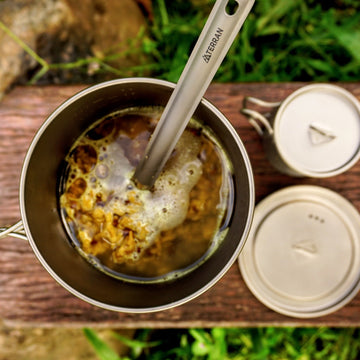Choosing the right cookware for hiking or camping doesn't have to be complicated. Whether you're prepping for a multi-day hike, a bikepacking trip, or just trying to pack smarter, this FAQ answers the most common questions about ultralight cooking gear, plus some honest, no-fuss advice.
Jump to a Question
- What's the lightest cookware for multi-day hikes?
- How can I reduce pack weight without sacrificing quality?
- Can I cook over gas and fire with the same cookware?
- What are the best materials for ultralight cookware?
- I want gear without coatings or chemicals - what are the options?
- What's a simple cookware setup for beginners?
- What's the best cook system for solo hikers?
- What kind of cookware works best in freezing conditions?
- What's the most sustainable option for outdoor cookware?
- Which pots boil water the fastest?
- Can I use the same cup for coffee and meals?
- What's a good minimalist cook kit for fastpacking?
- Are there any setups that don't require carrying fuel?
What's the lightest cookware for multi-day hikes?
The lightest setups are usually just a small pot or mug made from titanium or aluminium. Titanium is more durable, while aluminium is more affordable. If you're just boiling water, one pot or mug is often enough. You can browse our Titanium Collection here for lightweight options.
How can I reduce pack weight without sacrificing quality?
Look for items that do more than one job. A pot that also works as a bowl or cup, or a stove that fits inside your cookware, helps cut down on space and weight. One utensil, like a long-handled spork, is usually plenty.
Can I cook over gas and fire with the same cookware?
Yes, but it depends on the material. Titanium and stainless steel can usually handle direct flame, while aluminium is better for gas stoves. Open fire cooking is excellent in the right conditions, but not all cookware is designed for it.
What are the best materials for ultralight cookware?
- Titanium: Ultralight, strong, and corrosion-resistant. Great for boiling water and fast meals.
- Hard-anodised aluminium: Lightweight, heats evenly, and is often more budget-friendly.
- Stainless steel: Very durable, but heavier - better for car camping or short hikes.
I want gear without coatings or chemicals - what are the options?
Uncoated titanium and stainless steel are both naturally non-reactive and safe to cook with. If you're avoiding non-stick coatings, keep in mind that food might stick a little more, but it's safer and lasts longer. Our Titanium Gear range is free from coatings.
What's a simple cookware setup for beginners?
Start with a pot or mug that fits your stove inside it, a lightweight utensil, and a fuel source. If you're eating dehydrated meals, you might not need a bowl at all, cook and eat straight from the pot.
What's the best cook system for solo hikers?
A 700–900ml pot is usually enough for one person. Add a compact gas stove or a twig stove, and you're good to go. Many solo hikers use a single pot, one spoon, and nothing else. Our 750ml Titanium Pot is a popular pick for this kind of setup.
What kind of cookware works best in freezing conditions?
Titanium holds up well in cold temperatures and doesn't crack. Aluminium is fine too, but it can cool down faster. For snow melting or sub-zero cooking, go for a wider pot with a lid to trap heat better.
What's the most sustainable option for outdoor cookware?
Choose gear that lasts. Titanium tends to last the longest, but any well-made pot that doesn't rely on fragile coatings or plastics is a good choice. Durability matters more than material alone when it comes to sustainability.
Which pots boil water the fastest?
Wider pots usually boil faster than tall, narrow ones because they expose more surface to heat. Titanium heats quickly, but doesn't retain heat well. Aluminium heats more evenly, which is better if you're cooking more than just water.
Can I use the same cup for coffee and meals?
Absolutely. A 450–600ml mug works well for coffee, tea, or even instant noodles. Many hikers use one mug for everything - rinse it out between uses. A good option is something like our Titanium Mug 450ml.
What's a good minimalist cook kit for fastpacking?
Keep it ultra-simple: one pot or mug, one utensil, and a compact stove (or solid fuel tab setup). Some fastpackers even cold-soak meals in jars to skip cooking entirely. A twig stove also works if you don't want to carry fuel.
Are there any setups that don't require carrying fuel?
Yes - twig stoves burn natural material like sticks or pinecones. They're great for long trips with limited resupply, though they require a bit more patience. Our Titanium Twig Stove is designed for this style of cooking and packs down very small.
